This article was co-authored by Chris M. Matsko, MD. Dr. Chris M. Matsko is a retired physician based in Pittsburgh, Pennsylvania. With over 25 years of medical research experience, Dr. Matsko was awarded the Pittsburgh Cornell University Leadership Award for Excellence. He holds a BS in Nutritional Science from Cornell University and an MD from the Temple University School of Medicine in 2007. Dr. Matsko earned a Research Writing Certification from the American Medical Writers Association (AMWA) in 2016 and a Medical Writing & Editing Certification from the University of Chicago in 2017.
There are 17 references cited in this article, which can be found at the bottom of the page.
wikiHow marks an article as reader-approved once it receives enough positive feedback. In this case, several readers have written to tell us that this article was helpful to them, earning it our reader-approved status.
This article has been viewed 315,537 times.
The body is filled with numerous chemicals of various types, such as hormones, enzymes and neurotransmitters. Chemical imbalances happen due to diseases, injuries, aging, chronic stress and poor nutrition. When most people talk of chemical imbalance, however — especially doctors and researchers — they're referring to an imbalance of neurotransmitters or chemical messengers of the brain.[1] The prevailing medical theory is that depression, schizophrenia and many mood/behavioral disorders are caused by an imbalance of neurotransmitters, such as serotonin, dopamine and norepinephrine.[2] Psychotropic drugs are commonly recommended by doctors to try and balance these neurotransmitters and improve mood, although there are also many natural methods of establishing and maintaining healthy brain chemistry that don't trigger serious side effects.
Steps
Balancing Brain Chemicals Naturally
-
1Exercise more often. When you have anxiety or depression, exercise may not be high on your priority list, but research shows that it can make a big impact on mood by stimulating and/or balancing numerous chemicals and neurotransmitters in the body.[3] Regular exercise is theorized to help ease depression and anxiety in a number of ways, such as: releasing feel-good brain chemicals (neurotransmitters, endorphins and endocannabinoids); reducing immune system chemicals that are linked to worsening depression; and increasing body temperature, which seems to have general calming effects.
- Research published in 2005 found that walking briskly for about 35 minutes daily five times per week or 60 minutes daily three times per week had a significant impact on mild-to-moderate depression.[4]
- Other types of cardiovascular exercise that may provide similar benefits include swimming, cycling, jogging and dancing.
-
2Consume more omega-3 fatty acids. Omega-3 fatty acids are considered essential fats, which means your body (particularly your brain) needs them to function normally, but the body can't make them. As such, you must get them from food or supplements. Omega-3 fats are highly concentrated in the brain and appear to be important for cognition (brain memory and performance) and behavior. A variety of studies have shown that supplementing with omega-3 fatty acids (between 1,000 and 2,000 mg daily) can help relieve symptoms of depression, bipolar disorder, schizophrenia and attention deficit hyperactive disorder (ADHD).[5]
- Omega-3 fatty acids are found in fatty fish (salmon, mackerel, tuna, halibut), other seafoods, including shrimp, algae and krill, as well as some nuts and seeds (walnuts, flaxseed).
- If supplementing, consider taking fish oil, krill oil and/or flaxseed oil.
- Symptoms of omega-3 fatty acid deficiency include poor memory, mood swings and depression, among others.
- In one study, it was shown that 10 grams of fish oil daily helped bipolar patients treat their symptoms.[6]
Advertisement -
3Make sure you're not vitamin D deficient. Vitamin D is necessary for a variety of body functions including calcium absorption, healthy immune response and normal mood fluctuations. In fact, vitamin D is much more hormone-like in its actions than any other vitamin and a lack of it has been linked to depression as well as other mental disorders.[7] Unfortunately, many people (including most Americans) are deficient in vitamin D, which may be responsible for some of the nearly 15 million cases of depression among adults in the United States.[8] Vitamin D is made by your skin in response to intense summer sunshine and found in some foods.
- Avoidance of the sun may help explain why such a growing number of people are vitamin D deficient. Ask your doctor for a blood test to see if you're deficient.
- Vitamin D is stored in the body, so getting enough summer sunshine can last you throughout the winter months.
- If supplementing, use the D3 form of the vitamin and aim for between 1,000 and 4,000 IU per day (up to 40,000 IU daily has been shown to be safe).
- Foods that contain vitamin D include the flesh of fatty fish (salmon, tuna, mackerel), fish liver oils, beef liver and egg yolks.
- Keep in mind that vitamin D is fat-soluble, meaning excess amounts will be stored in your body (unlike water-soluble vitamins, which would just pass through in your urine), making it possible to overdose. The Institute of Medicine has defined a tolerable upper limit intake level to be 100 mcg or 4,000 IU a day in healthy adults.
-
4Consider taking plant-based medicine. If you are feeling depressed or anxious and realize that your thoughts and behaviors are not healthy, then consider plant-based therapy to help balance your brain chemistry. It turns out that more than 1/2 of Americans with panic attacks or severe depression use some form of herbal therapy to combat it.[9] Valerian root, passionflower, kava kava, ashwagandha root, St. John's wort, L-theanine, 5-HTP, ginseng and even chamomile are used as natural sedatives or antidepressants because of their ability to impact the brain and reduce stress and anxiety.
- Valerian root contains phytochemicals that interact with a brain chemical called GABA, which is involved with regulating anxiety, depression and related moods (drugs such as Valium and Xanax work in similar fashion) — best thought of as a sedative and sleep aid.
- St. John's wort reduces symptoms in people w/ mild-to-moderate, but not severe depression. Some research it works as well as antidepressant drugs Prozac and Zoloft.
- L-theanine (found in green tea and some other plants) increases GABA and dopamine levels in the brain and causes psychoactive changes, including reducing anxiety, improving cognition and balancing mood.
- 5-Hydroxytryptophan (5-HTP) is an amino acid that's converted in the brain to serotonin (brain's feel good chemical).
-
5Try acupuncture treatments. Acupuncture involves sticking very thin needles into specific energy points within the skin/muscle in efforts to reduce pain, combat inflammation, stimulate healing and balance the body's processes. .[10] Recent research suggests that acupuncture may be as effective for depression and other mood-related problems as antidepressant drugs, but without any of the side effects.[11] Based on the principles of traditional Chinese medicine, acupuncture works by releasing a variety of substances including endorphins and serotonin, which act to reduce pain and improve mood.
- It's also claimed that acupuncture stimulates the flow of energy, referred to as chi, which may also be involved in balancing brain chemistry.
- Acupuncture points that may provide relief for your chemical imbalance are spread throughout the body, including the head, hands and feet.
- Acupuncture is practiced by a variety of healthcare professionals including some physicians, chiropractors, naturopaths and psychologists — whoever you choose should be certified by NCCAOM.
Getting Help from Medical Professionals
-
1Consult with a mental health professional. If stress, anxiety and/or depression is negatively impacting your life, then talk with a mental health professional. A psychiatrist, psychologist or counselor can give you insights on your issue and attempt to address the underlying cause of your imbalance. Mental health professionals sometimes use drugless techniques and therapies, such as psychotherapy and cognitive-behavioral therapy.[12] Whether psychotherapy or cognitive-behavioral therapy can balance brain chemicals is unclear, but both therapies have a track record of success dealing with depression and anxiety — although it often takes many weeks or months.
- Psychotherapy is a type of counseling that addresses the emotional response to mental illnesses. Patients are encouraged to talk through strategies for understanding and dealing with their disorder.
- Cognitive-behavioral therapy involves patients learning to recognize and change their thought patterns and behaviors that lead to troublesome feelings.
- Unfortunately, there are no blood tests that can directly measure neurotransmitter levels in the brain; however, an imbalance of hormones (such as insulin or thyroid hormone) can be detected by blood tests and may be related to altered mood. Other measurable components in the blood that have been linked to depression include very high levels of copper, too much lead and low levels of folate.[13]
-
2Ask your doctor about SSRIs. The neurotransmitters serotonin, dopamine and norepinephrine are closely tied to depression and anxiety, so most antidepressant drugs are designed to affect these chemicals. For depression, doctors typically start by prescribing a selective serotonin reuptake inhibitor (SSRI) because these drugs are relatively safer and cause fewer serious side effects than other types of antidepressants.[14] SSRIs relieve symptoms by blocking the reabsorption (reuptake) of serotonin by certain nerve cells in the brain, which leaves more serotonin available to improve mood.[15]
- SSRIs include fluoxetine (Prozac, Selfemra), paroxetine (Paxil, Pexeva), sertraline (Zoloft), citalopram (Celexa) and escitalopram (Lexapro).
- SSRIs are considered relatively effective for treating all anxiety disorders, including depression and obsessive-compulsive disorder (OCD).
- Common side effects of SSRIs include insomnia (inability to get to sleep), sexual dysfunction and weight gain.
- Although SSRIs are often given to patients with an assumed chemical imbalance of serotonin, their use sometimes triggers "serotonin syndrome" — dangerously high levels of serotonin.
- Symptoms of Serotonin Syndrome include flushing of the skin, elevated heart rate, elevated temperature, elevated blood pressure, vomiting, and diarrhea. If you are having these symptoms and are on an SSRI then consult you doctor immediately.
- If you are having problems with side effects from SSRIs talk to your family doctor or psychiatrist. There are different profiles for each medication and each have different advantages and disadvantages. You doctor will know best which medication to prescribe.
-
3Consider SNRIs as an alternative. Serotonin-norepinephrine reuptake inhibitors (SNRIs) are similar to SSRIs, but they have a dual mechanism of action: they increase the levels of both serotonin and norepinephrine by inhibiting their reabsorption into neurons in the brain.[16] SNRI drugs are considered as effective as SSRIs, so they are also considered a first-line treatment that's commonly prescribed by doctors, especially for the treatment of generalized anxiety disorder.
- SNRIs include duloxetine (Cymbalta), venlafaxine (Effexor XR), desvenlafaxine (Pristiq, Khedezla) and levomilnacipran (Fetzima).
- Common side effects of SNRIs include insomnia, stomach upset, excessive sweating, headaches, sexual dysfunction and hypertension (high blood pressure).
- Some SNRIs like Cymbalta are approved to treat depression in those with chronic pain disorders. A drug like Effexor hand might be used in people with generalized anxiety disorder as well as depression.
- Taking SNRIs can also trigger an imbalance of serotonin levels in the brain referred to as serotonin syndrome.[17]
-
4Be cautious with benzodiazepines and tricyclic antidepressants. Benzodiazepines are an older class of drugs still used for short-term management of anxiety. They can be highly effective in promoting relaxation, reducing muscle tension and other physical symptoms associated with anxiety by enhancing the effect of the neurotransmitter GABA.[18] Benzodiazepines are not appropriate for long-term use, however, as there can be serious side effects, such as aggression, cognitive impairment, addiction, and deeper depression. As such, concerns about long-term use of benzodiazepines led many psychiatrists and physicians to favor tricyclic antidepressants before SSRIs and SNRIs came on the market. Tricyclics are relatively effective for treating anxiety because they increase serotonin levels in the brain, but they are also problematic long term. Consequently, tricyclic antidepressants aren't usually prescribed unless you've been on a SSRI and it hasn't worked for you.[19]
- Benzodiazepines include alprazolam (Xanax, Niravam), clonazepam (Klonopin), diazepam (Valium, Diastat) and lorazepam (Ativan).
- Tricyclic antidepressants include imipramine (Tofranil), nortriptyline (Pamelor), amitriptyline, doxepin, trimipramine (Surmontil), desipramine (Norpramin) and protriptyline (Vivactil).[20]
- Tricyclic antidepressants have the potential to be cardio-toxic and have to be used in caution in people with heart disease.[21]
Expert Q&A
-
QuestionCan a chemical imbalance cause shakiness?
 Chris M. Matsko, MDDr. Chris M. Matsko is a retired physician based in Pittsburgh, Pennsylvania. With over 25 years of medical research experience, Dr. Matsko was awarded the Pittsburgh Cornell University Leadership Award for Excellence. He holds a BS in Nutritional Science from Cornell University and an MD from the Temple University School of Medicine in 2007. Dr. Matsko earned a Research Writing Certification from the American Medical Writers Association (AMWA) in 2016 and a Medical Writing & Editing Certification from the University of Chicago in 2017.
Chris M. Matsko, MDDr. Chris M. Matsko is a retired physician based in Pittsburgh, Pennsylvania. With over 25 years of medical research experience, Dr. Matsko was awarded the Pittsburgh Cornell University Leadership Award for Excellence. He holds a BS in Nutritional Science from Cornell University and an MD from the Temple University School of Medicine in 2007. Dr. Matsko earned a Research Writing Certification from the American Medical Writers Association (AMWA) in 2016 and a Medical Writing & Editing Certification from the University of Chicago in 2017.
Family Medicine Physician Sure. For instance if you have an imbalance in your blood sugar this can cause you to be shaky and dizzy.
Sure. For instance if you have an imbalance in your blood sugar this can cause you to be shaky and dizzy. -
QuestionWhat is a normal serotonin level?
 Chris M. Matsko, MDDr. Chris M. Matsko is a retired physician based in Pittsburgh, Pennsylvania. With over 25 years of medical research experience, Dr. Matsko was awarded the Pittsburgh Cornell University Leadership Award for Excellence. He holds a BS in Nutritional Science from Cornell University and an MD from the Temple University School of Medicine in 2007. Dr. Matsko earned a Research Writing Certification from the American Medical Writers Association (AMWA) in 2016 and a Medical Writing & Editing Certification from the University of Chicago in 2017.
Chris M. Matsko, MDDr. Chris M. Matsko is a retired physician based in Pittsburgh, Pennsylvania. With over 25 years of medical research experience, Dr. Matsko was awarded the Pittsburgh Cornell University Leadership Award for Excellence. He holds a BS in Nutritional Science from Cornell University and an MD from the Temple University School of Medicine in 2007. Dr. Matsko earned a Research Writing Certification from the American Medical Writers Association (AMWA) in 2016 and a Medical Writing & Editing Certification from the University of Chicago in 2017.
Family Medicine Physician There is no biochemical measure of serotonin levels that doctors use to determine if you are depressed. We determine depression from clinical symptoms and then decided if an SSRI is needed for treatment.
There is no biochemical measure of serotonin levels that doctors use to determine if you are depressed. We determine depression from clinical symptoms and then decided if an SSRI is needed for treatment.
References
- ↑ http://www.scientificamerican.com/article/is-depression-just-bad-chemistry/
- ↑ http://www.health.harvard.edu/mind-and-mood/what-causes-depression
- ↑ https://www.health.harvard.edu/mind-and-mood/exercise-is-an-all-natural-treatment-to-fight-depression
- ↑ http://www.health.harvard.edu/mind-and-mood/exercise-and-depression-report-excerpt
- ↑ http://www.ncbi.nlm.nih.gov/pubmed/19499625
- ↑ https://www.health.harvard.edu/blog/omega-3-fatty-acids-for-mood-disorders-2018080314414
- ↑ http://www.ncbi.nlm.nih.gov/pmc/articles/PMC2908269/
- ↑ http://www.ncbi.nlm.nih.gov/pmc/articles/PMC2908269/
- ↑ http://www.scientificamerican.com/article/can-herbs-ease-anxiety-and-depression/
- ↑ http://www.mayoclinic.org/tests-procedures/acupuncture/basics/definition/prc-20020778
- ↑ http://www.scientificamerican.com/article/can-acupuncture-treat-depression/
- ↑ http://my.clevelandclinic.org/services/neurological_institute/center-for-behavorial-health/disease-conditions/hic-anxiety-disorders
- ↑ http://www.healthline.com/health-news/researcher-identifies-five-types-of-depression-050814#2
- ↑ http://www.mayoclinic.org/diseases-conditions/depression/in-depth/antidepressants/art-20046273?pg=1
- ↑ http://www.adaa.org/finding-help/treatment/medication
- ↑ http://www.adaa.org/finding-help/treatment/medication
- ↑ http://www.mayoclinic.org/diseases-conditions/depression/in-depth/antidepressants/art-20044970?pg=2
- ↑ http://www.adaa.org/finding-help/treatment/medication
- ↑ http://www.mayoclinic.org/diseases-conditions/depression/in-depth/antidepressants/art-20046273?pg=1
- ↑ http://www.mayoclinic.org/diseases-conditions/depression/in-depth/antidepressants/art-20046983
- ↑ Arana, GW, Rosenbaum, JF. Antidepressant drugs. In: Handbook of Psychiatric Drug Therapy, 4th ed, Lippincott Williams & Wilkins, Philadelphia 2000. p.53.
- ↑ http://www.health.harvard.edu/mind-and-mood/what-causes-depression
About This Article
To improve the balance of your brain chemistry naturally, get regular exercise to boost the natural “feel-good” chemicals in your brain. You can also promote better brain health by eating foods rich in omega-3 fatty acids, such as fish, nuts, and seeds. Additionally, check with your doctor to find out if you have a vitamin D deficiency. If so, taking a supplement or eating foods like fatty fish or egg yolks may help. Finally, talk to your doctor about trying alternative therapies, such as plant-based medicine or acupuncture. Keep reading for more tips from our Medical co-author, including how to get medical treatment for a chemical imbalance!






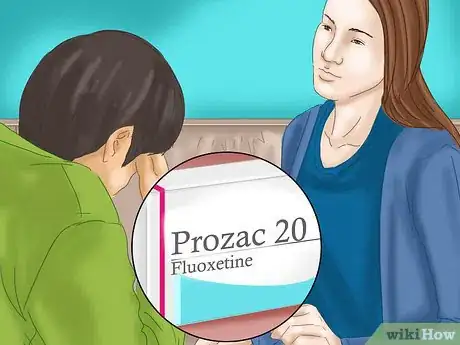

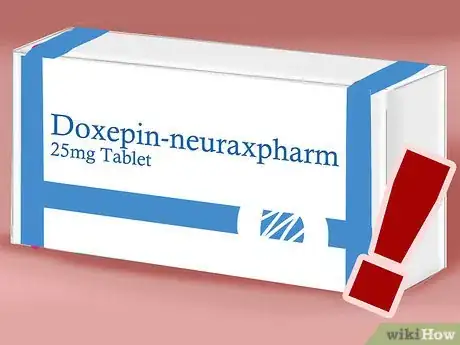
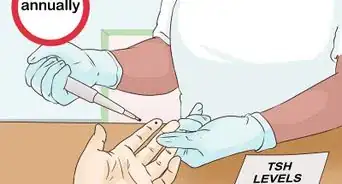



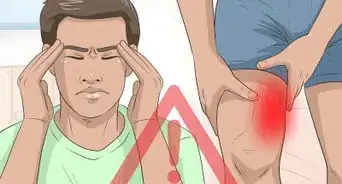






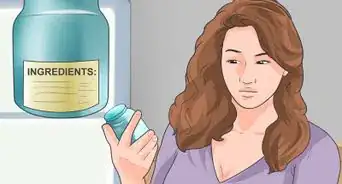
-Step-12-Version-2.webp)










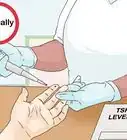






































Medical Disclaimer
The content of this article is not intended to be a substitute for professional medical advice, examination, diagnosis, or treatment. You should always contact your doctor or other qualified healthcare professional before starting, changing, or stopping any kind of health treatment.
Read More...